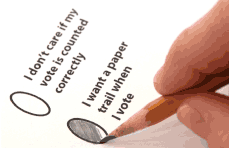

  |
|||
| . |
RESOURCES GET INVOLVED |
MD State Board of Elections releases RFP for new voting systemIn 2007 Maryland's General Assembly voted unanimously to replace our paperless touch-screen voting units with a system that enables voters to mark paper ballots and scan them in the polling place to tabulate votes. Voters who are unable to mark a paper ballot by hand or who prefer to use an electronic interface will be able to use a ballot-marking machine that prints out a paper ballot for scanning. This system provides an independent paper record of voter intent that can be used to recount close elections and to audit election results. It will be used starting in 2016. Maryland's State Board of Elections recently released a Request for Proposals (RFP) for the new voting equipment. The RFP closes September 9, 2014. Oral Presentations will be heard (approx) September 29 to October 3, 2014. Read more:
Vulnerabilities of Maryland's Online Registration System Put Voters at RiskUPDATE: In 2013, Maryland's General Assembly required additional personal identifying information to be gathered from voters to authorize transactions in the Online Voter Registration system. While the authentication used is still very weak, it is a step in the right direction. However, Maryland now offers absentee ballots to be delivered online and it is possible to receive one without supplying the additional identifying information. OCTOBER 2012 -- SAVE our Votes (SOV) recommends that Maryland voters check their voter registration information to make sure that no one has tampered with it, following revelations that hackers could easily gain access to Maryland's new online registration system. According to several nationally prominent computer security experts who recently wrote a letter to Maryland's State Board of Elections (SBE), the new online voter registration system has "severe security vulnerabilities" that "leave the system open to large-scale, automated fraud, and make the Maryland system among the most vulnerable of all states' new online voter registration systems." Voters could have difficulty voting on election day if their registration information was altered in certain ways. SOV first alerted the State Board of Elections about the problem in August 2012 and then worked with computer security experts and election advocates from other states to develop recommendations to prevent, detect, and recover from potential attacks. The computer experts wrote a letter to the SBE in late September suggesting specific remedies election officials could put in place, both immediately and after the election. The SBE has never formally acknowledged receipt of nor responded to the letter, though it was discussed at the agency's September 27 meeting. According to an article published in the New York Times, the SBE says it has checks in place to detect fraud. But the SBE does not acknowledge that legitimate transactions may be nearly impossible to distinguish from fraudulent ones, and that if problems are discovered in the polling place, procedures for resolving them must be outlined in advance. Stop the reckless rush toward voting over the internet
WE RECOMMEND: Maryland should follow the lead of other states and restrict the option of internet ballot delivery to military and overseas voters, groups that do not always have the safer voting options that are available to domestic absentee voters. Enforce state requirements for federal certification of all voting software and hardware, voter-verifiability of the official ballot, and protection of ballot privacy, which may be at risk with this system.
|
||